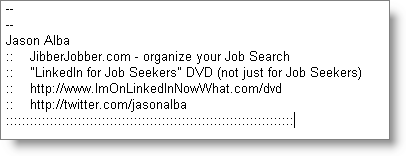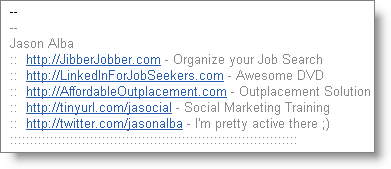I found Kyle Lacy on Twitter recently and really like what I saw. There are a number of his blog posts that are great.
In light of yesterday’s announcement I wanted to share his 25 tips on choosing a social media consultant, and MY thoughts on each of them:
1. They need to use the tools they are teaching.
It is extremely important that the teacher is using the tools. Before you decide to use a social media consultant… investigate! Make sure they are using tools like Twitter, Facebook, LinkedIN, and Plaxo. If they do not use the tools on a regular basis, they are just riding a wave.
2. They communicate with their audience.
The last person you will want to hire is someone who throws content out on the bed and doesn’t allow for two way communication. The best way to test this? Go to their Twitter account and make sure they are actually sending “RT” and replies to people. 2-way communication is key.
3. Do they call themselves a Social Media Expert? Ask about the 10,000 hours rule.
The person that calls themselves a “social media expert” is the last person you want to hire. Read Shikow’’s post about 10,000 hours to become an expert.
4. Ask them their definition of social media.
If they give you a list of tools. Fail them.
5. They will run your Twitter account for you.
It is impossible to ghost a Twitter account. YOU either use it or you don’t. Ghostwriting for a blog is a different story and NOT for this post.
6. Their blog is less than six months old with no comments. (thanks Beth)
7. Ask them about social bookmarking. Do they know what it is? Do they use it?
8. Have they taught a class before on social media? Even a webinar?
It is important that your consultant or educator has experience in teaching or presenting on social media. The last thing you want to do is spend money for something that is going to be a DRAG. You want to know that you are not wasting your money.
9. Are they a Just-add-water expert?
10. They actually have a personality and GET people.
It is important that your social media consultant have a personality. What do I mean by personality? They are not stuck in an office all day pecking away at Twitter and have no sense of humor. ALSO, they are not overly bubbly and excited about everything under the sun. Sanity is key.
11. They blog more than once a week.
It is important that the investigation goes deeper into the blogging world. Your social media consultant should be learning on a daily basis and expounding upon what they are learning by blogging. This does not have to be catered specifically to a BLOG (WordPress or blogger). You can always check Twitter on how they are communicating and learning.
12. They are linking and being linked.
Complete a Google link search and make sure your social media consultant actually has people and blogs linking back to their site. It is extremely important
13. Ask their opinion on viral marketing.
It is extremely important that your social media consultant and educator understand the concepts behind word-or-mouth marketing and viral marketing. Social media marketing is a relationship driven model. The evangelists and lovers of your product or service need to have the means to shout to the world… WE LOVE YOU!
14. Check out their website.
The first step to any Internet or social media strategy is the website. Do they have a communication driven website or is it a web 1.0 brochure driven site? Are they interacting with people? Are they talking about social media? Are they talking to YOU and not about their services.
15. What do other people think about them?
Mentors are one of the greatest asset to any small business owner. Who would they choose? Maybe they think social media is a waste of time. You need to take that into account. Maybe they were burned in the past? It is extremely important to get another perspective when entering into a relationship with any type of consultant or marketing professional.
16. They advise you to start a Facebook page as the first step.
It isn’t about starting in one spot. If you are new to the world of social media it may be smart to start USING Facebook other than trying to manage all 5 but the last thing you need to do is just start a Facebook fan page. SM strategy should be surrounding an integrated marketing approach. Period.
17. The instant success test.
It takes time and knowledge to be successful at using social media as a small business strategy. If they promise instant results.. You should probably find another consultant.
18. What do they think about traditional marketing and advertising?
Ask them. If they come back to you and say that the traditional approach to marketing is dead. They are just riding the wave of no return. They will never understand the concepts of combining traditional and new media into an overall strategy. You will slowly drown them.
19. Ask them about Radian6.
Radian6 is one of the better brand monitoring companies out there. If they have no idea about Radian6. FAIL.
20. How long have they been using Twitter?
I have come across plenty of consultant who have been using Twitter for a matter of months. It is important for the consultant to know more than YOU… the client. Check up on their usage of the different tools on the web.
21. They believe in actually listening to your problems instead of convincing you about the world of social media.
22. If they are still using an @aol.com, @aim.com, @comcast.net, or @att.net email. Fail them.
23. Listen for new approaches to strategy.
Everyone is offering to be a “social” consultant. Do they talk and think differently than anyone else you have listened to? If they do… You have a gem on your hands. Creative thinkers are the best social media consultants.
24. Are they a used car salesman? Do they seem genuine?
For the sake of argument I am going to list this. Do not work with someone you do not trust. Period.
25.Do they have any success stories?
Ask them about their history in using social media. The space is extremely new but there are people who are succeeding in using the tool. If they do not have case studies. Ask. If they cannot present you with a valuable case study… find someone else.
There are plenty more but this is just the beginning. Add to the list if you would like!
1. They need to use the tools they are teaching.
I totally agree – they have to eat their own dog food. I’ve seen social media experts who have made a lot of money (stay with me) selling products and coaching on how to use social media… but they haven’t ever sold any non-social-media stuff. They have jumped on the bandwagon at the right time, made TONS of money, but haven’t really done it themselves.
2. They communicate with their audience.
True. I’ve been not-as-great as this as I’ve wanted to… at the same time, I hate seeing a blog post where every other comment is from the blog author saying “thanks!”
3. Do they call themselves a Social Media Expert? Ask about the 10,000 hours rule.
I’ll typically let others call me an expert (in anything) rather than me saying I am one. Same with guru, etc. Let others give you the title.
With regard to the 10,000 rule, considering someone has spent the last 4 years immersed in social media (at 40 hours a week), they still wouldn’t have hit 10,000 hours… I doubt that some people who we all admire have 10k hours, but I get the point… a newbie vs. a veteran… 🙂
4. Ask them their definition of social media.
Kyle says: “If they give you a list of tools. Fail them.” Oh my gosh. I can’t agree more. I work with very busy people… they don’t want a list of 25 places to go, or tools to use, or accounts to have. Give me a break – social media is not a list of the hundreds of places – think more about strategy and tactics.
5. They will run your Twitter account for you.
Kyle says: “It is impossible to ghost a Twitter account.” I agree. Twitter has to have a genuine person, with a personality, behind it. There are techniques to take the pressure off of constant updates, or posting daily, or whatever, but I would not suggest ghost tweeting if you are marketing your own stuff.
6. Their blog is less than six months old with no comments.
Considering blogging has been around for a long time I mostly agree… however, there will be many new blogs starting now, or that have started a few months ago, that are quite credible. One way to get around this is to develop the persona of “I’m a newbie learning – won’t you learn along with me? Let’s go!” … I’ve seen that work quite well.
With regard to no comments, I mostly agree there, also… although getting comments on blogs has gotten increasingly difficult because some people might comment on Twitter or Facebook or other places and that might now show up on the blog post… more on that here.
7. Ask them about social bookmarking. Do they know what it is? Do they use it?
I don’t use it. Oops. Or not oops. I think it depends on your product/service and audience… for me it hasn’t hit my radar much, considering I have limited bandwidth.
8. Have they taught a class before on social media? Even a webinar?
I can see this point… I’m guessing that a “coach” in social media will have done multiple presentations.
9. Are they a Just-add-water expert?
Not sure what that means but I’m guessing it refers to all the people who have read a book or article and say they are an expert. LOTS of those.
10. They actually have a personality and GET people.
Yep, agreed. Kyle says to not go to the extreme – either no personality or TOO MUCH. Yeah, totally.
11. They blog more than once a week.
Totally. I say your blog is the anchor of your social marketing strategy for a reason, you BETTER blog more than once a week!
12. They are linking and being linked.
Yeah, being known is good. Although there are “experts” out there who are known but still don’t have real world experience… selling their own stuff….
13. Ask their opinion on viral marketing.
I don’t get what Kyle writes in his original post on this, but my thoughts go to “viral videos.” You don’t make a viral video, you make a video that goes viral. You don’t send a viral message, you send a message that goes viral.
Regarding “viral marketing” in general, this is one of the most amazing aspects of the internet.
14. Check out their website.
yeah… if they don’t have a website, that might be a problem :p
15. What do other people think about them?
I think it might be hard to really figure this out – online I see a lot of ego stroking… people are pretty quick to say nice stuff and endorse… unless you are young and immature… but there are places to see this, like LinkedIn Recommendations, etc.
16. They advise you to start a Facebook page as the first step.
I would never suggest that – FB is so very misunderstood and even though they are beyond huge, they are not the first place I’d recommend for most businesses.
17. The instant success test.
Kyle says “If they promise instant results.. You should probably find another consultant.” Agreed – if you are looking for instant you might want to go back to your day job. Let’s think about long-term… networking and relationships is LONG TERM.
Instantly results can lead to instant failure.
18. What do they think about traditional marketing and advertising?
He makes good points here. I have strong opinions about this… 🙂
19. Ask them about Radian6.
Kyle says “If they have no idea about Radian6. FAIL.” I totally disagree. I have heard of Radian6 but couldn’t tell you what they do (well, I know now). At the small business, entrepreneur level where you don’t want to spend thousands of dollars on their types of services they are irrelevant – not knowing who they are is not a fail, it just means that they have impressed Kyle and he thinks they have awesome services (which they probably do).
20. How long have they been using Twitter?
Mostly important, but I’ve seen some social marketing practioners who have been using other tools well but have small followings on Twitter. Twitter is not the be-all, end-all. Powerful, important, etc. but not critical for all businesses.
I think this point suffers from the “when all you have is a hammer, all of your problems look like a nail” syndrome.
21. They believe in actually listening to your problems instead of convincing you about the world of social media.
Agree – because sometimes your important solutions might not even be social marketing.
22. If they are still using an @aol.com, @aim.com, @comcast.net, or @att.net email. Fail them.
LOL. I have to agree with this… I know plenty of successful business people who use those email systems, but if you are in the social space, as an expert or consultant, that would be a red flag for me.
Notice he didn’t put gmail on the list? I’m sure that is intentional.
23. Listen for new approaches to strategy.
Creative doesn’t always mean better or good… too many times I see these “new approaches” tried by early adopters … who always seem to be jumping from one thing to another… I like principle-based stuff and prefer not to jump all over the place, on all the networks.
24. Are they a used car salesman? Do they seem genuine?
Kyle says: “Do not work with someone you do not trust. Period.” Yep, trust your gut. And if their sales page wears out your mouse scroll wheel.. um… 🙁
25.Do they have any success stories?
Success stories OF THEIR OWN. That could be an increase of sales, a media gig (getting on TV or print), etc.
Thanks Kyle, for giving me stuff to think about and the opportunity to comment on stuff that’s also been bugging me a for a while!



